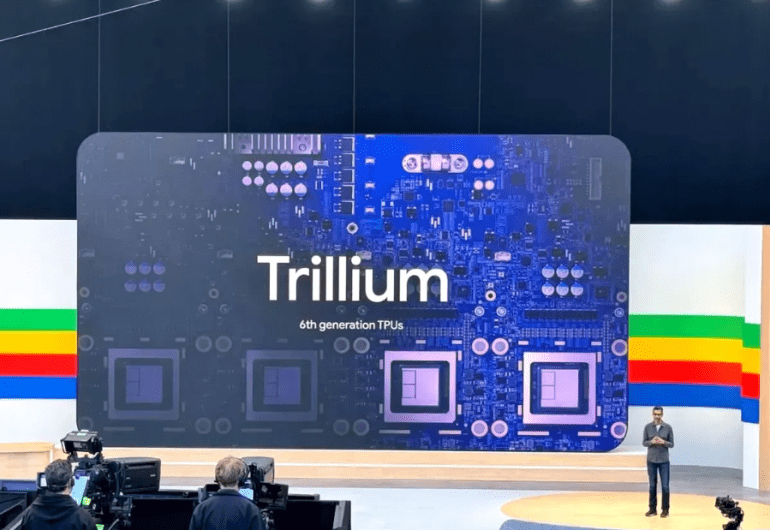- Google’s parent company, Alphabet, introduces Trillium, a new AI data center chip.
- Trillium offers nearly five times the speed of its predecessor, representing a significant advancement in processing power.
- Alphabet CEO Sundar Pichai emphasizes the exponential growth in demand for machine learning (ML) computing, highlighting Google’s decade-long commitment to AI innovation.
- Trillium emerges as a formidable contender to Nvidia’s dominance in the AI chip market.
- Google’s integrated software ecosystem, optimized for tensor processing units (TPUs), reinforces its position in the semiconductor sector.
- The sixth-generation Trillium chip promises 4.7 times better computing performance and a 67 percent increase in energy efficiency compared to previous versions.
- Google plans to make Trillium available to its cloud customers by late 2024.
Main AI News:
In a strategic move to bolster its AI capabilities, Google’s parent company, Alphabet, has introduced Trillium, the latest addition to its artificial intelligence (AI) data center chip portfolio. Boasting nearly five times the speed of its predecessor, Trillium marks a significant leap forward in processing power.
Addressing the press on Tuesday, Alphabet CEO Sundar Pichai emphasized the exponential growth in demand for machine learning (ML) computing, citing a staggering increase of one million times over the past six years, with a tenfold rise annually. Pichai underscored Google’s longstanding commitment to pioneering AI advancements, spanning over a decade of innovation.
Alphabet’s foray into custom AI chips for data centers emerges as a formidable contender to Nvidia’s dominant position in the market. With an integrated software ecosystem optimized for Google’s tensor processing units (TPUs), the company has successfully captured a considerable market share.
While Nvidia currently commands an 80 percent share of the AI data center chip market, Google’s TPUs occupy the remaining 20 percent, presenting a competitive landscape in the semiconductor sector. Notably, Google does not retail its chips but offers access through its cloud computing platform, further solidifying its position in the industry.
The sixth-generation Trillium chip promises a substantial leap in computing prowess, boasting 4.7 times the performance of its predecessor, TPU v5e. Designed to power sophisticated applications such as natural language processing and media generation from large models, the Trillium processor also delivers a 67 percent improvement in energy efficiency over its predecessor.
Google has announced plans to make the new chip available to its cloud customers by late 2024, signaling a strategic move to empower businesses with cutting-edge AI capabilities. With Trillium, Google reaffirms its commitment to driving innovation and shaping the future of AI-enabled technologies.
Conclusion:
Google’s launch of the Trillium chip marks a significant milestone in the AI semiconductor industry, challenging Nvidia’s market dominance. With its enhanced computing performance and energy efficiency, Trillium positions Google as a key player in shaping the future of AI-enabled technologies, offering businesses cutting-edge solutions for data center efficiency and machine learning applications.

